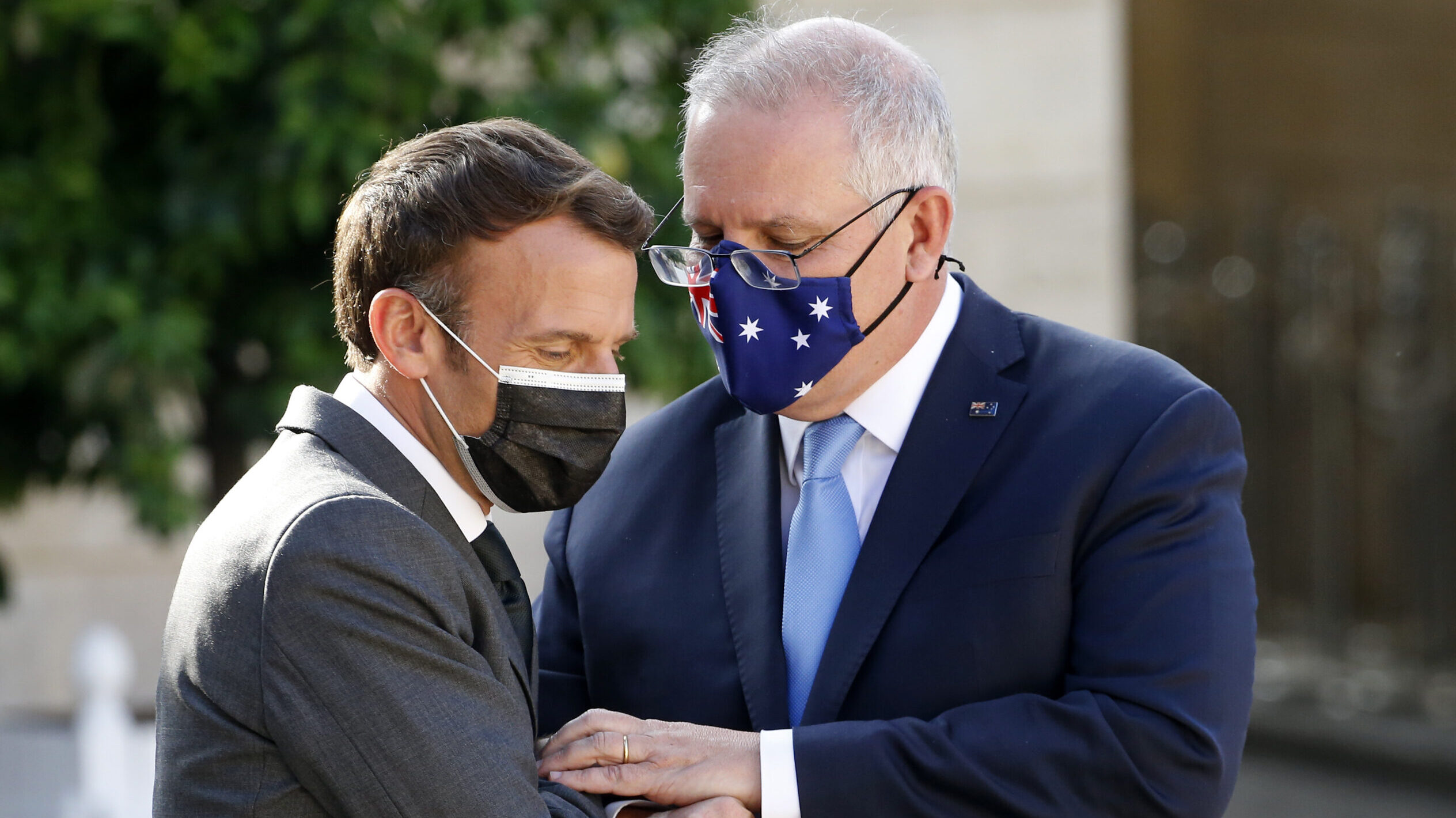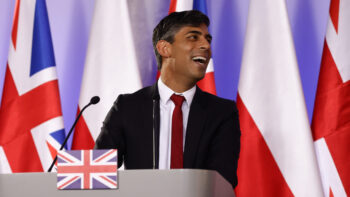
French President Emmanuel Macron (L) and former Australian Prime Minister Scott Morrison (R) during happier days in 2021. (Photo by Chesnot/Getty Images)
PARIS: The surprise settlement announced June 11 between France and Australia over the latter’s 2021 unilateral cancellation of the $63.5bn Future Submarine Program could represent a big step towards restoring the strained relationship between the two countries.
Australia will pay French shipbuilder Naval Group €555m ($584m) as compensation for killing the deal in favor of a US-made option, bringing the total cost of the scrapped program to $2.4bn.
Newly elected Australian Prime Minister Anthony Albanese said “this is a fair and equitable settlement that has been reached,” adding that “it follows (…) discussions that I’ve had with President [Emmanuel] Macron and I thank him for those discussions and the cordial way in which we are establishing a better relationship between Australia and France.”
“Naval Group and the Commonwealth of Australia have reached a fair and equitable settlement to bring a conclusion to the Future Submarine Program,” the French company said in a brief statement. It added that it “has worked closely with and assisted its partners and subcontractors in Australia and France” and paid “tribute to all individuals, teams, and its partners who have worked and delivered on this program for more than five years.” It also recognized “the important work of those who contributed to the discussions leading to this agreement.”
Sébastien Lecornu, France’s new Minister for the Armed Forces, met his Australian counterpart, Richard Marles on the sidelines of the Shangri-La dialogue in Singapore on June 11. Following this meeting, Lecornu issued a statement in which he took “note of the conclusion of the agreement between Australia and Naval Group on the termination of the Australian future submarine program” and “expressed the wish that this agreement and the change of the government team will make it possible to overcome the crisis of confidence with Australia.”
He added that France would “listen to Australian proposals to project the bilateral defense relationship into the future, on the basis of operational cooperation and structuring projects” and noted that “the principle of new work meetings in Paris has been recorded.”
1er entretien avec @RichardMarles, nouveau ministre de la Défense australien dans le prolongement de l’échange entre @EmmanuelMacron et @AlboMP. Nous avons exploré les pistes pour dépasser la crise de confiance avec l'Australie et projeter notre relation de défense vers l'avenir. pic.twitter.com/ZkkVhZlbqh
— Sébastien Lecornu (@SebLecornu) June 11, 2022
Albanese stated that although this the total cost is still less than the $3.88bn the Australian Senate was told would result from the cancellation, it was still a steep price to pay — and quickly threw the blame onto the recently-defeated Liberal government of Scott Morrison.
“It still represents an extraordinary waste from a government that was always big on announcement but not good on delivery and from a government that will be remembered as the most wasteful government in Australia’s history since Federation,” Albanese said.
Albanese said France was an important ally for Australia, one which “has a significant presence in the Pacific at a time when tension in the Indo-Pacific means that we need to work with our partners.” France’s territories in the Pacific — New Caledonia, Wallis and Futuna, French Polynesia and Clipperton Island — contribute to giving it the world’s largest exclusive economic zone of 4.5 million square miles.
The settlement draws a line under a contract signed in February 2019 by the Morrison government to acquire 12 conventionally-powered Attack-class submarines from Naval Group that were to be built in Adelaide. The first of the submarines was expected to be operational in 2034 with each subsequent ship delivered every two years thereafter. But on Sept. 16, 2021 Morrison announced his government was scrapping the contract and instead entering a new pact, known as AUKUS, with the United Kingdom and the United States to acquire nuclear-powered submarines even though Australia does not have a domestic nuclear industry.
That the settlement occurred so quickly after Albanese took office may not be a coincidence. In his early days in office, the new Prime Minister has made it a point to meet and travel with key partners for his nation. Putting an end to the drama around the submarine switcharoo — which the former French foreign minister described as a “stab in the back” and led to France briefly recalling its ambassadors from Australia and the United States — makes sense as Albanese tries to set his new government up for foreign policy success.
The groundwork may have been laid during a May 26 phone call between Albanese and Macron. According to an Australian readout, the two agreed during the call to “rebuild a bilateral relationship based on trust and respect” following the submarine fight. A statement published by the French Presidency said “a roadmap will be drawn to create this new bilateral agenda, which will help identify areas for strategic cooperation between our two countries, strengthen our resilience and achieve regional peace and security.”
According to an update published in May (prior to the election) by the Australian Strategic Policy Institute progress has been made on AUKUS with the signature on Nov. 22, 2021 of the Exchange of Naval Nuclear Propulsion Information Agreement between the three nations which, amongst other things, will allow “Australian personnel to access training and education from their UK and US counterpart, necessary for learning hot to safely and effectively build, operate and support nuclear-powered submarines’” But ASPI notes that nuclear proliferation commitments require “close consultation” with the International Atomic Energy Agency (IAEA) and that “it’s already apparent that some other member states aren’t going to give Australia an easy passage.” ASPI notes that “progress has been less visible in the other areas of technology”, i.e.hyersonic and counter-hypersonic capabilities, electronic warfare, innovation and information sharing.






















